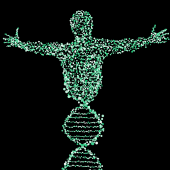Our website uses cookies so we can analyse our site usage and give you the best experience. Click "Accept" if you’re happy with this, or click "More" for information about cookies on our site, how to opt out, and how to disable cookies altogether.
We respect your Do Not Track preference.

Genealogy is apparently the second most popular hobby in the United States, after gardening. In New Zealand, we’ve also seen a growing interest in tracing one’s ancestry. It has become a much discussed topic in online forums and the news media. Some of this boom has been driven by the ease with which people can submit the DNA information to find matches via genealogical websites such as Ancestry.com.
Biological father
Earlier this year, we received an enquiry from a man whose sister had submitted DNA to Ancestry.com. His sister subsequently discovered that she had a ‘close relative’ that no one in the family knew about. The sister made contact with this person who explained they were the product of a sperm donation. It was then a short step for the sister and her family to conclude that our enquirer must have been the donor and was the biological father of the ‘close relative’.
The enquirer told us the fact he had been a sperm donor was a private matter that he was very upset to have been uncovered by his sister. When he gave sperm in the 1980s, he had been told by the health agency he would be doing it anonymously and it would not be traceable.
Our enquirer felt it was an important issue that could affect others like him and he sought our help because Ancestry.com had not sought his consent in disclosing the existence of the close relative to his sister.
Privacy impact
We contacted Ancestry.com to ask how it dealt with such situations. We were interested to know what policies it had in place which addressed the potential impact on the privacy of third parties (in this case, our enquirer).
Ancestry.com told us the service was committed to the policy that customers should always maintain ownership and control over their own data. Many people took the Ancestry DNA test with the specific intention of finding out new facts about themselves, and this included finding the existence of previously unknown relatives.
In acknowledging any unintended consequences, in its privacy statement, Ancestry.com said: “You may discover unexpected facts about yourself or your family when using our services. Once discoveries are made, we can’t undo them”.
Ancestry.com provided customers with privacy resources so they would be making informed decisions when choosing to submit their DNA. Customers had to decide whether their DNA matches would be shared with other customers. If they did opt in, their DNA code would be viewable by other customers who had themselves similarly opted-in.
Therefore, our enquirer had been unlucky to have his privacy impacted because both his sister and the close relative had chosen to make their DNA information viewable enabling a match to be made. They were then able to share further information with each other. Our enquirer realised he could not change the circumstances of his situation but if possible he did want to prevent any possibility of it happening again.
Personal affairs
But we were unable to assist further. The Privacy Act regulates personal information and how agencies collect, use, disclose, and store that information. Section 56 of the Act says that the obligations in these principles do not apply to the actions of individuals acting in their own personal capacity, or in relation to their “personal, family, or household affairs”.
We noted the significant impact on our enquirer which resulted in information about him becoming known to his family. But this was not the result of the actions of Ancestry.com, it was the result of the actions of his sister and the relative. To prevent it happening again, the sister could agree to change her privacy settings so her DNA information was no longer viewable by others or she could request Ancestry.com delete her information (a facility which the service provides).
While the Privacy Act is not a guide on what individuals in these circumstances can and can’t do, it’s important to do your homework and be aware of the possible privacy implications for others when you put your DNA on a searchable database like Ancestry.com. Some family members might not be quite as enthusiastic as you about your new hobby.
For further reading, the Ancestry.com privacy statement can be found here. You can also find out more in these articles here and here.
This article was first published by NZ Doctor on 12 September 2018.
Image credit: Man DNA Spiral by NeuPaddy (Creative Commons Licence)
Back